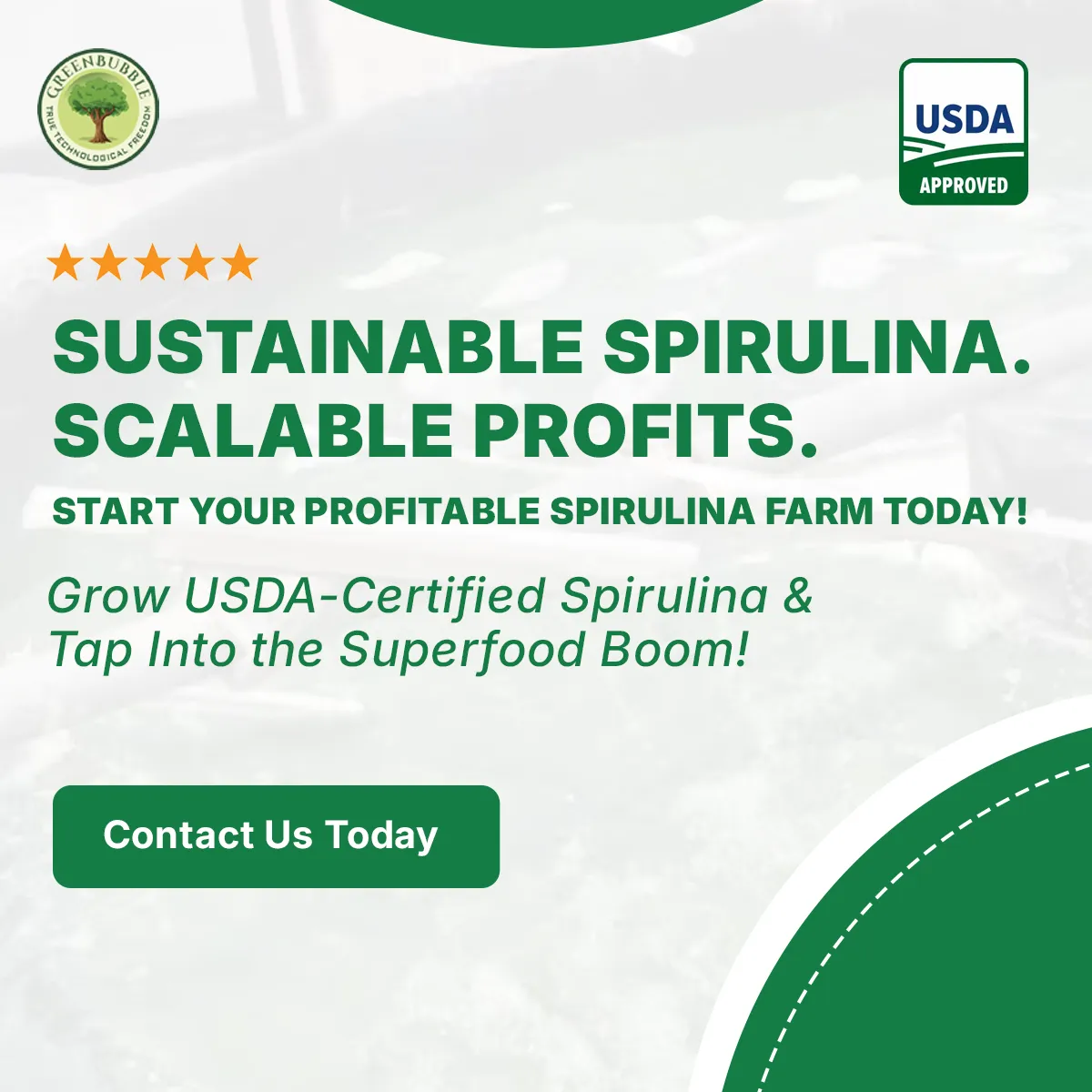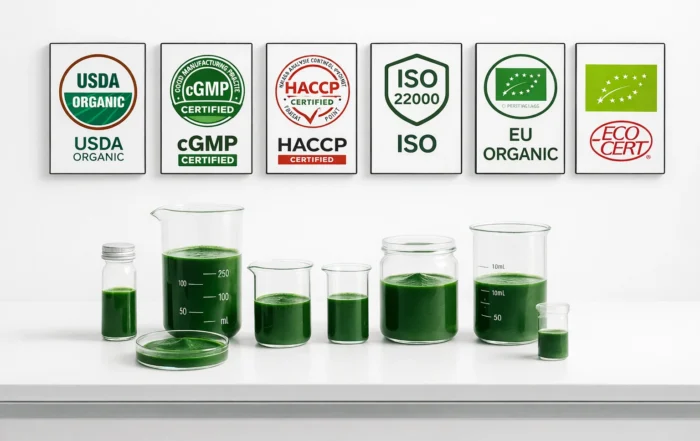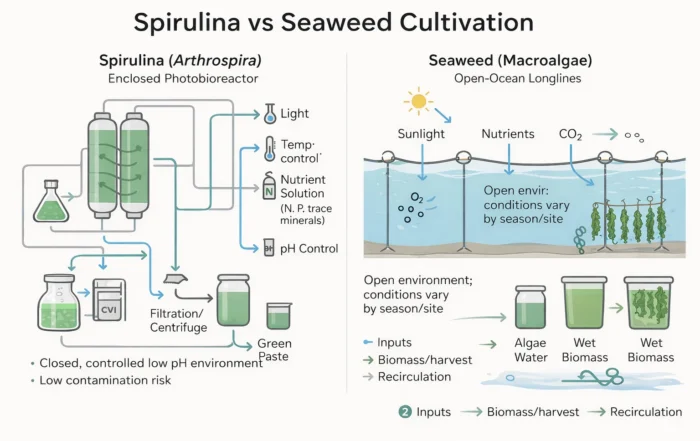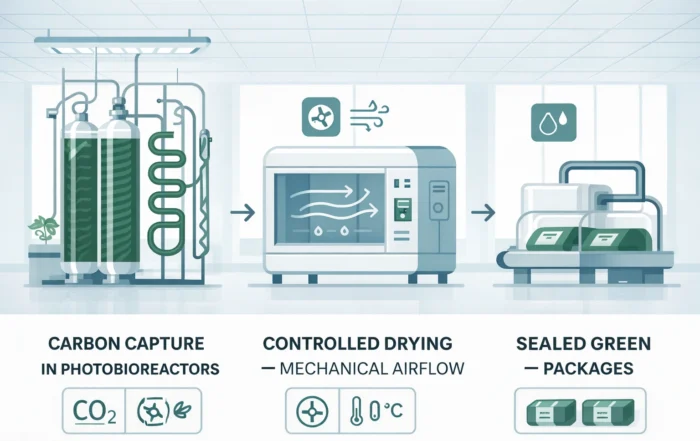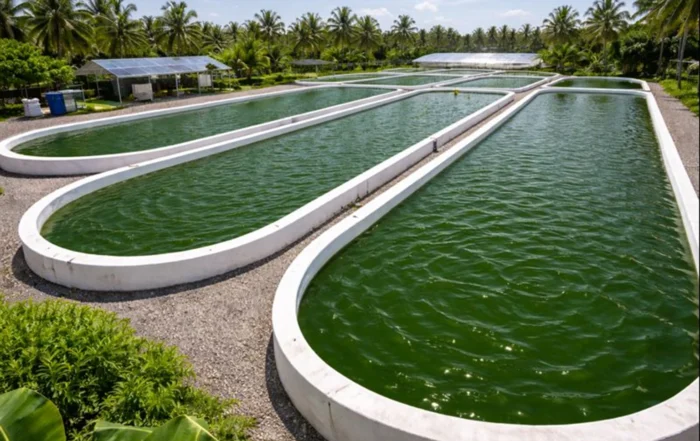Introduction
India has rapidly become one of the leading producers of spirulina, thanks to its favorable climate, expanding nutraceutical industry, and growing interest in sustainable farming. As global demand for organic spirulina surges, Indian farmers and entrepreneurs are seizing the opportunity to position themselves as key suppliers in international markets. However, exporting spirulina isn’t as simple as growing and shipping—it requires rigorous certifications, lab validation, and compliance with international food safety standards.
This guide explores the complete roadmap for exporting organic spirulina from India to global markets, including certifications, testing, logistics, and profitability insights.
Why Export Organic Spirulina from India?
India is uniquely positioned to dominate the global spirulina export market for several reasons:
- Climatic Advantage: Semi-arid and tropical regions provide ideal conditions for spirulina cultivation, with temperatures ranging between 30–37°C.
- Low Production Costs: Compared to the U.S., Europe, or Japan, India offers lower labor and operational costs, making it competitive in global markets.
- Government Support: MSME, APEDA, and other export-promotion schemes encourage farmers to enter international markets.
- Rising Health Awareness: With the nutraceutical market booming, Indian producers can tap into demand for affordable, certified spirulina.
Global Market Demand for Organic Spirulina
Organic spirulina is in demand across nutraceuticals, food & beverages, cosmetics, and animal feed industries. The strongest export destinations include:
- United States: Largest market for organic spirulina supplements.
- European Union (Germany, France, UK): High demand for organic-certified superfoods.
- Japan & South Korea: Longstanding consumers of algae-based health supplements.
- Middle East: Increasing demand for natural supplements and fortified foods.
The global spirulina market is projected to grow steadily, driven by consumer preference for chemical-free, organic-certified products.
Certification Requirements for Export
Certification is the most critical step in exporting spirulina. Without it, consignments face rejection at customs or loss of buyer trust.
USDA Organic & EU Organic
- No synthetic fertilizers or pesticides.
- Complete traceability of nutrient inputs.
- Strict audits and record-keeping.
HACCP (Hazard Analysis and Critical Control Points)
- Identification and control of contamination risks.
- Documentation of preventive measures.
GMP (Good Manufacturing Practices)
- Cleanroom facilities for drying and packaging.
- Minimal human contact during harvesting and processing.
COA (Certificate of Analysis)
- Mandatory for every batch.
- Includes nutritional values (protein, phycocyanin, vitamins, minerals) and safety results (absence of heavy metals, pesticides, pathogens).
Indian Export-Specific Requirements
- FSSAI: Food safety compliance for human-grade spirulina.
- APEDA: Registration required for agricultural exports.
- DGFT & IEC Code: Import Export Code mandatory for all exporters.
Quality Control Before Export
Before reaching global markets, spirulina must undergo rigorous lab testing and quality control:
- Nutritional Validation: Protein content (≥60%), phycocyanin (≥10%), chlorophyll, β-carotene, GLA levels.
- Microbiological Testing: Ensure absence of E. coli, Salmonella, Staphylococcus, and coliforms.
- Heavy Metal Screening: Lead, arsenic, cadmium, mercury within permissible limits.
- Pesticide & Aflatoxin Analysis: Must comply with international residue standards.
For more details, see Spirulina Quality Control in Mass Production.
Steps to Export Spirulina from India
Exporting spirulina involves structured procedures to ensure compliance and smooth trade operations:
| Step | Action | Authority |
| 1 | Register as an exporter | DGFT (Directorate General of Foreign Trade) |
| 2 | Obtain IEC (Import Export Code) | DGFT |
| 3 | Secure FSSAI license | FSSAI |
| 4 | Register with APEDA for agricultural export | APEDA |
| 5 | Obtain USDA/EU Organic Certification | Accredited agencies |
| 6 | Implement HACCP & GMP protocols | Certifying bodies |
| 7 | Set up in-house QC lab & COA system | Internal/export labs |
| 8 | Partner with export logistics firms | Freight forwarders |
This checklist ensures farms are ready for international buyers.
Challenges in Exporting Spirulina
While the opportunities are vast, spirulina exporters face challenges:
- Stringent Buyer Requirements: Buyers demand USDA/EU Organic, HACCP, and GMP compliance.
- Global Competition: China, the U.S., and Japan are strong players in spirulina exports.
- Shelf-Life Management: Spirulina powder must remain stable during long shipping times.
- Documentation Burden: Every batch must be traceable, with full lab reports and audit trails.
For related insights, read Spirulina Export Machinery Compliance Guide.
ROI and Profitability in Spirulina Export
Exporting spirulina can be highly profitable, provided compliance costs are managed. Certified organic spirulina fetches premium pricing:
- Domestic Pricing: ₹600–800/kg (non-certified).
- Export Pricing: ₹1500–2500/kg (organic certified).
While setup costs for automation, labs, and certifications can reach ₹1.5–2 crore for 2–3 acres, the ROI improves significantly with export contracts. Learn more in Economic Viability of Large-Scale Spirulina Production.
Sustainable Branding Advantage
Export markets increasingly value sustainability and traceability. Farms that emphasize:
- Organic inputs.
- Low carbon footprint through solar drying/automation.
- Transparency in traceability (blockchain, COA reports).
…can access higher-value markets. Explore more in Spirulina Farming as a Sustainable Business.
FAQs
1. Which countries import the most spirulina from India?
The U.S., Germany, France, Japan, and South Korea are the top importers of organic spirulina from India.
2. What certifications are mandatory for export?
USDA Organic or EU Organic certification, HACCP, GMP, and batch-wise COAs are essential. Indian exporters also need FSSAI and APEDA compliance.
3. Why do some spirulina shipments get rejected?
Common reasons include contamination (microbial or heavy metals), lack of organic certification, or incomplete documentation.
4. Is spirulina export profitable for small farmers?
Small farms face challenges with certification costs but can collaborate through cooperatives or partner with export houses to access international markets.
Conclusion
Exporting organic spirulina from India presents massive opportunities, but success requires strict adherence to certifications, lab testing, and global compliance standards. With the right infrastructure, farmers can transition from local sales to international trade, achieving higher margins and long-term sustainability.
India has the climate, expertise, and cost advantages to become a global leader in spirulina exports. For farmers and businesses ready to invest in certification and quality control, the world is indeed the market.


